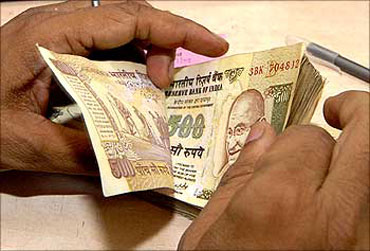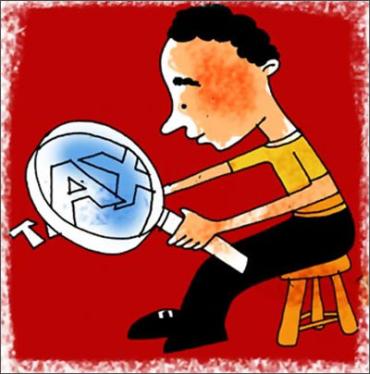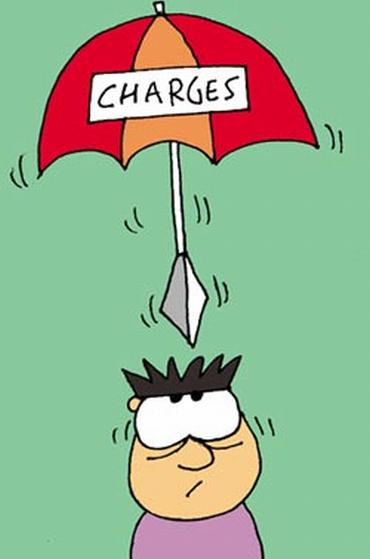Photographs: Rediff Archives Anil Rego
The budget is definitely thumbs up for the common man: it was indeed a pleasant budget, which left a lot on the platter for the salaried and the young. Surprising, since this was a non-election year, the budget for the year 2010-2011 was presented in the midst of highly challenging environment and yet, it managed to please most on the street.
The finance minister laid emphasis on growth led by consumption and savings by leaving more money in the hands of individuals. Here's a quickie on the various changes brought about during the budget that will impact the salaried class.
Tax & savings
When it comes to the salaried people the most important issues is that of taxation, the recent measures announced in the budget are quite positive for them: Here is an overview of the same:
| Tax slab | Tax rate | |
| Old | New | |
| Males: Up to Rs 1.6 lakh | Males: Up to Rs 1.6 lakh | Nil |
| Females: Rs 1.9 lakh | Females: Rs 1.9 lakh | |
| Senior citizens: Rs 2.4 lakh | Senior citizens: Rs 2.4 lakh | |
| Rs 1.6 lakh to Rs 3 lakh | Rs 1.6 lakh to Rs 5 lakh | 10 per cent |
| Rs 3 lakh to Rs 5 lakh | Rs 5 lakh to Rs 8 lakh | 20 per cent |
| Rs 5 lakh and above | Rs 8 lakh and above | 30 per cent |
The increase in tax slabs will increase disposable amount (money that can be set aside for spending) with the salaried people and this in turn will impact the consumption pattern and savings, leading to enhanced standard of living.
Example of income tax saved
Here is an overview of the tax saving; a pretty impressive preposition for the higher income bracket.
| Salary | Rs 200,000 | Rs 300,000 | Rs 400,000 | Rs 500,000 | Rs 600,000 | Rs 700,000 | Rs 800,000 |
| Tax payable: Previous slab | Rs 4,120 | Rs 14,420 | Rs 35,020 | Rs 55,620 | Rs 86,520 | Rs 117,420 | Rs 148,320 |
| Tax payable: Current slab | Rs 4,120 | Rs 14,420 | Rs 24,720 | Rs 35,020 | Rs 55,620 | Rs 76,220 | Rs 96,820 |
| Savings | NA | NA | Rs 10,300 | Rs 20,600 | Rs 30,900 | Rs 41,200 | Rs 51,500 |
Now, clearly it depends on what you choose to do with the extra dough: Invest or spend, either way the economy benefits.
Simplification of tax filing
With a clear focus and emphasis on the infrastructure sector, investment in infrastructure bonds will allow deduction up to Rs 20,000 over and above the Rs 1 lakh limit u/s 80C. However, with the increased tax slabs, the tax saving for people up to salary income of Rs 5 lakh will only be 10 per cent, making tax saving a little unattractive.
The provisions of section 80D have been extended and it now allows deduction for contribution to health insurance schemes and contribution to Central Government Health Schemes.
Simplification of tax filing
For those of you who fiddled with the ITR forms last year, there is a breather; SARAL II is all set to be launched which will be simpler and user-friendly for the salaried class to file income tax returns.
Introduction of GST
Implementation of GST (goods and services tax) was a much-awaited aspect. The major benefactor of this move will be the aam aadmi (the common person). There will be potential reduction in prices of products. The reason being the tax burden in the form of multiple levels of taxes on products and services will come down. This budget gave a definite date for the implementation of GST by April 2011. With this in mind, the service tax was retained at 10 per cent.
What's expensive and what's not
Fuel prices are set to increase: With the budget announcement on central excise and custom duty the prices of petrol may increase by Rs 3 per litre and diesel by about Rs 2 per litre. Prices of cooking gas may increase by Rs 50 per cylinder and kerosene by Rs 3 per litre.
With excise / custom duty hikes some items got dearer: Consumer durables, automobiles, fuel, bullion, cigarettes etc. are among them. Although the measures taken will leave more money in your hands but the increase in prices of various items could nibble at your pockets in a small way.
Although, increase in excise duty on FMCG products is definitely a cause for concern in the wake of rising inflation, surprisingly, food inflation fell to 17.58 per cent for the week ended February 13, partially lower than the 17.97 per cent recorded in the previous week.
So what's cheaper
If Pranab Mukherjee made a few things expensive then he was obligated to make a few things cheaper too. Mobile accessories, medical equipment, energy efficient CFLs, set top boxes, compact discs, toys and books have become cheaper.
Disappointments
Well, as they say 'nothing is perfect', there was one concession the FM did not give; there was much hope on the streets that the gratuity limit would be increased to Rs 10 lakh from the current Rs 3.5 lakh, however, this did not happen and has left many individuals who are planning to hang up their boots disappointed.
Conclusion
We have seen that focus of the changes in the tax slab was to increase disposable income in the hands of consumer which is well illustrated in the earlier example. Overall the budget is in favour of the salaried class people by introducing new tax slabs, simplifying tax filings and adding some new deductions.
We give thumbs up to Pranab Mukherjee for pulling off this feat with great elan despite considerations on managing the high fiscal deficit.




Comment
article